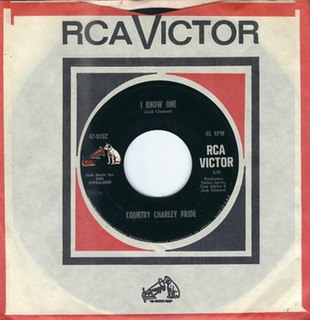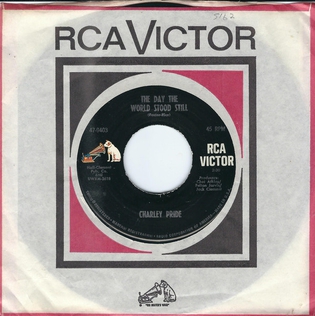Related Research Articles
"When I Stop Leaving " is a song written by Kent Robbins, and recorded by American country music artist Charley Pride. It was released in May 1978 as the first single from his album Burgers and Fries/When I Stop Leaving . The song peaked at number 3 on the Billboard Hot Country Singles chart. It also reached number 1 on the RPM Country Tracks chart in Canada.
"A Whole Lotta Things to Sing About" is a song written by Ben Peters, and recorded by American country music artist Charley Pride. It was released in August 1976 as the first single from his album She's Just an Old Love Turned Memory. The song peaked at number 2 on the Billboard Hot Country Singles chart. It also reached number 1 on the RPM Country Tracks chart in Canada.
"The Happiness of Having You" is a song written by Ted Harris, and recorded by American country music artist Charley Pride. It was released in November 1975 as the first single and title track from his album The Happiness of Having You. The song peaked at number 3 on the Billboard Hot Country Singles chart. It also reached number 1 on the RPM Country Tracks chart in Canada.
"I Ain't All Bad" is a song written by Johnny Duncan, and recorded by American country music artist Charley Pride. It was released in March 1975 as the first single from his album Charley. The song peaked at number 6 on the Billboard Hot Country Singles chart. It also reached number 1 on the RPM Country Tracks chart in Canada.

"Mississippi Cotton Picking Delta Town" is a song written by Harold Dorman and George Gann, and recorded by American country music artist Charley Pride. It was released in August 1974 as the first single from his album Pride of America. The song peaked at number 3 on the Billboard Hot Country Singles chart. It also reached number 1 on the RPM Country Tracks chart in Canada.
"We Could" is a song written by Felice Bryant and originally recorded by "Little" Jimmy Dickens in 1955. It's been recorded by numerous acts over the years, including American pop crooner Al Martino, whose version peaked at number 41 on Billboard Hot 100 chart in December 1964, but is best remembered by a version recorded by American country music artist Charley Pride. It was released as the first single from his album Country Feelin'. This version, released nearly ten years after Martino's, peaked at number 3 on the Billboard Hot Country Singles chart. It also reached number 1 on the RPM Country Tracks chart in Canada.
"All His Children" is a song recorded by American country music artist Charley Pride with music by Henry Mancini. It was released in January 1972 and was the theme of the film Sometimes a Great Notion. The song peaked at number 2 on the Billboard Hot Country Singles chart. It also reached number 1 on the RPM Country Tracks chart in Canada.
"The Power of Love" is a song written by Gary Nicholson and Don Cook, and recorded by American country music artist Charley Pride. It was released in May 1984 as the first single and title track from his album The Power of Love. The song peaked at number 9 on the Billboard Hot Country Singles chart.
"Ev'ry Heart Should Have One" is a song written by Bill Shore and Byron Gallimore, and recorded by American country music artist Charley Pride. It was released in September 1983 as the second single from his album Night Games. The song peaked at number 2 on the Billboard Hot Country Singles chart.
"Roll On Mississippi" is a song written by Kye Fleming and Dennis Morgan, and recorded by American country music artist Charley Pride. It was released in February 1981 as the second single and title track from his album Roll On Mississippi. The song peaked at number 7 on the Billboard Hot Country Singles chart.
"Missin' You" is a song written by Kye Fleming and Dennis Morgan, and recorded by American country music artist Charley Pride. It was released in October 1979 as the second single from his album You're My Jamaica. The song peaked at number 2 on the Billboard Hot Country Singles chart.

The discography of American country music artist Charley Pride contains 75 singles, one other charting song, two promotional singles, one featured single and 11 music videos. Pride signed his first recording contract with RCA Victor in 1966. His first two singles failed to become hits. His third single, "Just Between You and Me," became a hit when it reached the top ten of the country charts. Pride had several more top ten hits over the next several years until he had first chart-topper in 1969. The single, "All I Have to Offer You ," reached number one on the Billboard Hot Country Songs chart and spent 17 weeks charting. This was followed by five more number one hits, including "Is Anybody Goin' to San Antone." All of these singles also reached low-end positions on the Billboard Hot 100.

"I Know One" is a song written by Jack Clement, and recorded by American country music artist Charley Pride. It was released in March 1967 as the second single from the album Pride of Country Music. The song was Pride's fourth single and his second major hit as a recording artist.

"Does My Ring Hurt Your Finger" is a song written by Jerry Crutchfield and Don Robertson, and recorded by American country music artist Charley Pride. It was released in August 1967 as the first single from the album The Country Way. The song was Pride's fifth single and his third major hit as a recording artist.

"The Day the World Stood Still" is a song written by Jerry Foster and Bill Rice, and recorded by American country music artist Charley Pride. It was released in December 1967 as the second single from the album The Country Way. The song was Pride's sixth single and his fourth major hit as a recording artist.

"The Easy Part's Over" is a song written by Jerry Foster and Bill Rice, and recorded by American country music artist Charley Pride. It was released in April 1968 as the first single from the album Songs of Pride...Charley That Is. The song was Pride's seventh single and his fifth major hit as a recording artist.

"Let the Chips Fall" is a song written by Jack Clement, and recorded by American country music artist Charley Pride. It was released in September 1968 as the first single from the album The Sensational Charley Pride. The song was Pride's eighth single and his sixth major hit as a recording artist.

"Let Me Live" is a song written by Ben Peters. It was originally recorded by American country music artist Charley Pride. The song was produced by Jack Clement and was released as a single via RCA Victor Records in 1971. The song became a top 40 hit on the Billboard country chart and in Canada. It was Pride's only gospel recording to become a major hit.

"Down on the Farm" is a song written by Eddie Setser, John Greenebaum and Troy Seals, and recorded by American country music artist Charley Pride. It was released in January 1985 as the first single from his Greatest Hits, Volume 2 compilation album. The song became a top 40 hit on the Billboard country chart.

"Amy's Eyes" is a song written by Terry Brown and Jaima Prater Hunt, and recorded by American country music artist Charley Pride. It was released in December 1989 as the third single from the album Moody Woman. The song became the final top 40 hit of Pride's career.
References
- ↑ "Billboard Hot Country Singles". Billboard. 24 June 1972. p. 40. Retrieved 1 May 2017.
- ↑ "Charley Pride singles". Allmusic . Retrieved November 25, 2011.
- ↑ "Charley Pride Chart History (Hot Country Songs)". Billboard.